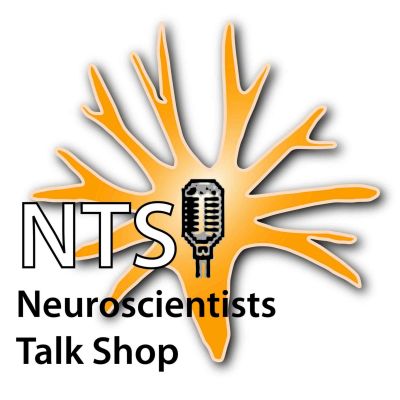Neuroscientists Talk Shop is the University of Texas at San Antonio's (UTSA) Neurobiology Podcast, showcasing the current research of internationally renowned guest Neuroscientists. Each episode features a moderated discussion with a cross section of UTSA Neurobiology faculty, highlighting the featured guest's research, and the state of the art in the field at hand.
https://podcasters.spotify.com/pod/show/neuroscientists-talk-shop
Gesamtlänge aller Episoden: 12 days 6 hours 19 minutes
- 1
- 1
episode 181: Episode 181 -- Dwight Bergles PhD
Thursday, January 18, 2018
Dwight Bergles (Johns Hopkins) discusses his work characterizing a fourth mysterious class of CNS glial cells, called oligodendrocyte precursor cells...
episode 182: Episode 182 -- Marco Gallio PhD
Thursday, February 8, 2018
Marco Gallio (Northwestern) talks about temperature sensation in Drosophila as a “fruitful” model system for examining sensory encoding and propagation of representations through a relatively reduced sensorimotor system...
episode 183: Episode 183 -- Astrocytes in Synaptic Control Symposium
Friday, February 9, 2018
Recorded as a panel discussion following the UTSA Neurosciences Institute’s 2018 research symposium. The group discusses the tripartite synapse concept, which was coined by two of our panelists, Phil Haydon and Alfonso Araque, in the late 1990s. The group considers the diverse mechanisms of astrocyte-neuron communication and the magnitude of how we are beginning to redefine the neural circuits of behavior and disease based on this new framework...
episode 184: Episode 184 -- Ed Stern PhD
Thursday, February 22, 2018
Ed Stern (Bar-Ilan University, Israel) discusses corticostriatal networks in mouse models of Alzheimer’s disease.
Duration: 42 minutes
Discussants:(in alphabetical order)
Alfonso Apicella (Asst Prof, UTSA)
Salma Quraishi (Res Asst Prof, UTSA)
Charles Wilson (Ewing Halsell Chair, UTSA)
acknowledgement: JM Tepper for original music.
episode 185: Episode 185 -- John Mantsch PhD
Thursday, March 1, 2018
John Mantsch (Marquette University) discusses various animal models of drug relapse that differentiate aspects of how stress impinges on reward circuits to promote drug seeking...
episode 186: Episode 186 -- Ulrich Hofmann PhD
Thursday, March 22, 2018
Ulrich Hofmann (Freiburg University) discusses the priorities and realities in implementing control theory, computational models and engineering principles to build implantable devices that can read and write to the nervous system as an approach for treating CNS disorders like paralysis, epilepsy, depression, and others...
episode 187: Episode 187 -- Charles Gerfen PhD
Thursday, September 27, 2018
Chip Gerfen (NIMH) talks about his defining work in describing the input-output organization of the basal ganglia, and how early ideas of pathway-level organization principles have yielded an appreciation of the explosive anatomical and molecular diversity of individual neurons within those pathways...
episode 188: Episode 188 -- Marisela Morales PhD
Thursday, October 4, 2018
Marisela Morales (NIDA) discusses the anatomical and functional complexity of VTA projections, including the distinctive synaptic architecture of dual GABAergic glutamatergic synapses in the habenula, and the indispensability of electron microscopy for understanding the diversity of brain circuits...
episode 189: Episode 189 -- Josh Dudman PhD
Thursday, October 25, 2018
Josh Dudman (HHMI Janelia) discusses his model of how the basal ganglia shape performance based on prior experience by controlling the gain of movement kinematics. The group considers this history-dependent gain computation model alongside the traditional action selection model...
episode 190: Episode 190 -- Maurice Chacron PhD
Thursday, November 1, 2018
Maurice Chacron (McGill) talks about optimal coding mechanisms invoked in sensory perception of the electric fish. He discusses his “awake behaving” model, through which he has deciphered that feedback from descending inputs tunes sensory responses through a “temporal whitening” function which may be conserved across species...
- 1
- 1
